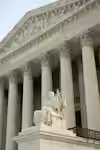Chamber Litigation Center

Fighting for business in the courts
Founded in 1977, the U.S. Chamber Litigation Center fights for business at every level of the U.S. judicial system, on virtually every issue affecting business, including class actions and arbitration, labor and employment, energy and environment, securities and corporate governance, financial regulation, free speech, preemption, government contracts, and criminal law.
Explore the case database
Use advanced search features to view recent activity on the regulatory litigation and amicus briefs the Litigation Center has filed on behalf of the business community.
Why the U.S. Chamber Is Fighting to Protect Amicus Filers
Featured Story
Proposed changes to the federal rules could harm important First Amendment rights and impose unnecessary burdens on amicus filers and federal courts.
Request access to the Litigation Center's newsletter
Request access to exclusive updates about the U.S. Chamber Litigation Center's lawsuits and amicus briefs protecting the American business community.
Leadership


Recent case activity by issue
Latest Content
- The U.S. Chamber's Litigation Center has successfully reined in federal regulators and limited government micromanagement.The U.S. Chamber of Commerce, along with the American Petroleum Institute, the National Mining Association, and the Business Council of New York, filed a lawsuit against the state of New York over its new retroactive liability law.The U.S. Supreme Court overturned Chevron deference, and the Chamber will help businesses assess its impact.Proposed changes to the federal rules could harm important First Amendment rights and impose unnecessary burdens on amicus filers and federal courts.Employees at small firms are able to keep their flexibility thanks to court striking down U.S. Department of Labor's one-size-fits-all wage structure.The Chamber’s success in the courts upholds the rule of law, defends the free enterprise system, and supports faster economic growth.





